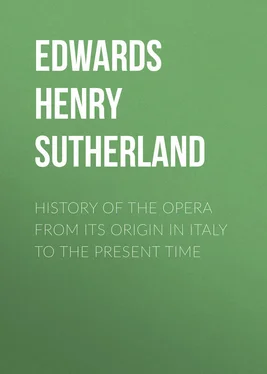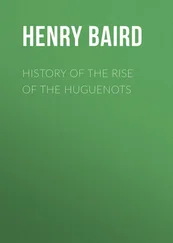Henry Edwards - History of the Opera from its Origin in Italy to the present Time
Здесь есть возможность читать онлайн «Henry Edwards - History of the Opera from its Origin in Italy to the present Time» — ознакомительный отрывок электронной книги совершенно бесплатно, а после прочтения отрывка купить полную версию. В некоторых случаях можно слушать аудио, скачать через торрент в формате fb2 и присутствует краткое содержание. Жанр: foreign_home, music_dancing, foreign_antique, foreign_prose, на английском языке. Описание произведения, (предисловие) а так же отзывы посетителей доступны на портале библиотеки ЛибКат.
- Название:History of the Opera from its Origin in Italy to the present Time
- Автор:
- Жанр:
- Год:неизвестен
- ISBN:нет данных
- Рейтинг книги:4 / 5. Голосов: 1
-
Избранное:Добавить в избранное
- Отзывы:
-
Ваша оценка:
- 80
- 1
- 2
- 3
- 4
- 5
History of the Opera from its Origin in Italy to the present Time: краткое содержание, описание и аннотация
Предлагаем к чтению аннотацию, описание, краткое содержание или предисловие (зависит от того, что написал сам автор книги «History of the Opera from its Origin in Italy to the present Time»). Если вы не нашли необходимую информацию о книге — напишите в комментариях, мы постараемся отыскать её.
History of the Opera from its Origin in Italy to the present Time — читать онлайн ознакомительный отрывок
Ниже представлен текст книги, разбитый по страницам. Система сохранения места последней прочитанной страницы, позволяет с удобством читать онлайн бесплатно книгу «History of the Opera from its Origin in Italy to the present Time», без необходимости каждый раз заново искать на чём Вы остановились. Поставьте закладку, и сможете в любой момент перейти на страницу, на которой закончили чтение.
Интервал:
Закладка:
H. Sutherland Edwards
History of the Opera from its Origin in Italy to the present Time With Anecdotes of the Most Celebrated Composers and Vocalists of Europe
HISTORY OF THE OPERA
CHAPTER I.
PREFACE, PRELUDE, PROLOGUE, INTRODUCTION, OVERTURE, ETC. – THE ORIGIN OF THE OPERA IN ITALY, AND ITS INTRODUCTION INTO GERMANY. – ITS HISTORY IN EUROPE; DIVISION OF THE SUBJECT
IT has often been said, and notably, by J. J. Rousseau, and after him, with characteristic exaggeration, by R. Wagner, that "Opera" does not mean so much a musical work, as a musical, poetical, and spectacular work all at once; that "Opera" in fact, is "the work," par excellence , to the production of which all the arts are necessary. 1 1 Wagner calls the composer of an opera "the sculptor or upholsterer," (which is complimentary to sculptors,) and the writer of the words "the architect." I would rather say that the writer of the words produces a sketch, on which the composer paints a picture. Since writing the above I find that the greatest of French poets describes an admirable libretto of his own as " un canevas d'opéra plus ou moins bien disposé pour que l'œuvre musicale s'y superpose heureusement ;" and again, " une trame qui ne demande pas mieux que de se dérober sous cette riche et éblouissante broderie qui s'appelle la musique ." (Preface to Victor Hugo's Esmeralda .) I may add, that, in comparing Rossini with Beaumarchais, it must always be remembered that the former possesses the highest dramatic talent of a serious, passionate kind – witness Otello and William Tell ; whereas Beaumarchais's serious dramatic works, such as La Mère Coupable , Les Deux Amis , and Eugénie (the best of the three), are very inferior productions.
The very titles of the earliest operas prove this notion to be incorrect. The earliest Italian plays of a mixed character, not being constructed according to the ancient rules of tragedy and comedy, were called by the general name of "Opera," the nature of the "work" being more particularly indicated by some such epithet or epithets as regia , comica , tragica , scenica , sacra , esemplare , regia ed esemplare , &c. ; and in the case of a lyrical drama, the words per musica , scenica per musica , regia ed esemplare per musica , were added, or the production was styled opera musicale alone. In time the mixed plays (which were imitated from the Spanish) fell into disrepute in Italy, while the title of "Opera" was still applied to lyrical dramas, but not without "musicale," or "in musica" after it. This was sufficiently vague, but people soon found it troublesome, or thought it useless, to say opera musicale , when opera by itself conveyed, if it did not express, their meaning, and thus dramatic works in music came to be called "Operas." Algarotte's work on the Opera (translated into French, and entitled Essai sur l'Opéra ) is called in the original Saggio sopra l'Opera in musica . "Opera in music" would in the present day sound like a pleonasm, but it is as well to consider the true meaning of words, when we find them not merely perverted, but in their perverted sense made the foundation of ridiculous theories.
The Opera proceeds from the sacred musical plays of the 15th century as the modern drama proceeds from the mediæval mysteries. Ménestrier, however, the Jesuit father, assigns to it a far greater antiquity, and considers the Song of Solomon to be the earliest Opera on record, founding his opinion on these words of St. Jérôme, translated from Origen: — Epithalamium, libellus, id est nuptiale carmen, in modum mihi videtur dramatis a Solomone conscriptus quem cecinit instar nubentis sponsæ . 2 2 Ménestrier, des representations en musique, anciennes et modernes, page 23.
Others see the first specimens of opera in the Greek plays; but the earliest musical dramas of modern Italy, from which the Opera of the present day is descended directly, and in an unbroken line, are "mysteries" differing only from the dramatic mysteries in so far that the dialogue in them was sung instead of being spoken. "The Conversion of St. Paul" was played in music, at Rome, in 1440. The first profane subject treated operatically, was the descent of Orpheus into hell; the music of this Orfeo , which was produced also at Rome, in 1480, was by Angelo Poliziano, the libretto by Cardinal Riario, nephew of Sixtus IV. The popes kept up an excellent theatre, and Clement IX. was himself the author of seven libretti .
At this time the great attraction in operatic representations was the scenery – a sign of infancy then, as it is a sign of decadence now. At the very beginning of the sixteenth century, Balthazar Peruzzi, the decorator of the papal theatre, had carried his art to such perfection, that the greatest painters of the day were astonished at his performances. His representations of architecture and the illusions of height and distance which his knowledge of perspective enabled him to produce, were especially admired. Vasari has told us how Titian, at the Palace of la Farnesina, was so struck by the appearance of solidity given by Peruzzi to his designs in profile, that he was not satisfied, until he had ascended a ladder and touched them, that they were not actually in relief. "One can scarcely conceive," says the historian of the painters, in speaking of Peruzzi's scenic decorations, "with what ability, in so limited a space, he represented such a number of houses, palaces, porticoes, entablatures, profiles, and all with such an aspect of reality that the spectator fancied himself transported into the middle of a public square, to such a point was the illusion carried. Moreover, Balthazar, the better to produce these results, understood, in an admirable manner the disposition of light as well as all the machinery connected with theatrical changes and effects."
In 1574, Claudio Merulo, organist at St. Mark's, of Venice, composed the music of a drama by Cornelio Frangipani, which was performed in the Venetian Council Chamber in presence of Henry III. of France. The music of the operatic works of this period appears to have possessed but little if any dramatic character, and to have consisted almost exclusively of choruses in the madrigal style, which was so successfully cultivated about the same time in England. Emilio del Cavaliere, a celebrated musician of Rome, made an attempt to introduce appropriateness of expression into these choruses, and his reform, however incomplete, attracted the attention of Giovanni Bardi, Count of Vernio. This nobleman used to assemble in his palace all the most distinguished musicians of Florence, among whom were Mei, Caccini, and Vincent Galileo, the father of the astronomer. Vincent Galileo was himself a discoverer, and helped, at the Count of Vernio's musical meetings, to invent recitative – an invention of comparative insignificance, but which in the system of modern opera plays as important a part, perhaps, as the rotation of the earth does in that of the celestial spheres.
Two other Florentine noblemen, Pietro Strozzi and Giacomo Corsi, encouraged by the example of Bardi, and determined to give the musical drama its fullest development in the new form that it had assumed, engaged Ottavio Rinuccini, one of the first poets of the period, with Peri and Caccini, two of the best musicians, to compose an opera which was entitled Dafne , and was performed for the first time in the Corsi Palace, at Florence, in 1597.
Dafne appears to have been the first complete opera. It was considered a masterpiece both from the beauty of the music and from the interest of the drama; and on its model the same authors composed their opera of Euridice , which was represented publicly at Florence on the occasion of the marriage of Henry IV. of France, with Marie de Medicis, in 1600. Each of the five acts of Euridice concludes with a chorus, the dialogue is in recitative, and one of the characters, "Tircis," sings an air which is introduced by an instrumental prelude.
Читать дальшеИнтервал:
Закладка:
Похожие книги на «History of the Opera from its Origin in Italy to the present Time»
Представляем Вашему вниманию похожие книги на «History of the Opera from its Origin in Italy to the present Time» списком для выбора. Мы отобрали схожую по названию и смыслу литературу в надежде предоставить читателям больше вариантов отыскать новые, интересные, ещё непрочитанные произведения.
Обсуждение, отзывы о книге «History of the Opera from its Origin in Italy to the present Time» и просто собственные мнения читателей. Оставьте ваши комментарии, напишите, что Вы думаете о произведении, его смысле или главных героях. Укажите что конкретно понравилось, а что нет, и почему Вы так считаете.












